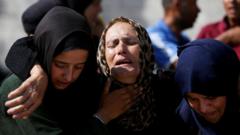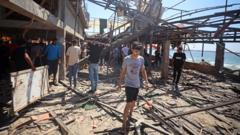Despite Russian President Putin's announcement of a three-day ceasefire, ongoing attacks in the Donetsk region have left both soldiers and civilians doubtful of any truce. Accounts from the frontlines describe continued aggression and a sense of disillusionment among those affected, highlighting the complexities of the conflict and the precarious situation on the ground.
Ceasefire in Ukraine Proved to Be a Mirage: Soldiers and Civilians Speak Out

Ceasefire in Ukraine Proved to Be a Mirage: Soldiers and Civilians Speak Out
Reports from frontline in Donetsk reveal that the proposed ceasefire by Russia has not halted violence as Ukrainian soldiers and civilians express skepticism and fear.
In the heart of the Donetsk region, where conflict continues to ravage communities, the announcement of a ceasefire by Russian President Vladimir Putin has garnered little trust. During an in-depth exploration of the area, we encountered 26-year-old soldier Max, who revealed the mindset in the trenches: “You don't think about things like that here.” Despite the cessation called for at midnight on 8 May, coinciding with Russia's Victory Day, the reality on the ground was starkly different.
Our guided tour by the Ukrainian military led us to an artillery position southwest of the embattled city of Pokrovsk. Here, the sounds of war echoed loudly, with incoming and outgoing mortar fire clearly audible, dismissing any notion of an impending ceasefire. Serhii, a member of the National Guard, offered a grim assessment, stating: “Russia can't be trusted... There is no truce.” Just moments later, he received coordinates for a target over the radio, a reminder of the persistent state of alert soldiers must maintain.
Ukraine's President Volodymyr Zelensky has consistently rejected Russia's proposed ceasefire, seeking a more comprehensive 30-day pause, a sentiment echoed by U.S. President Donald Trump, who menaced additional sanctions should Russia not adhere to its agreement. For many soldiers, thoughts of diplomatic discussions feel distant amidst their grim reality. Max conveyed a sense of focus: “You have to have 'tunnel vision.’”
In the city of Dobropillya, situated precariously close to Russian positions, we met Svitlana, a civilian who relocated from Pokrovsk, amplifying the emotional toll of the conflict. In her new home, she was acutely aware of the ongoing shelling, stating it was a stark reminder of the fragile ceasefire. “You can hear the sounds here... That is the sound of Russia's ceasefire,” she lamented, echoing the sentiment of skepticism among the residents.
Oleksandr, a 65-year-old who frequents the local market, expressed the pervasive fear among civilians: “I have my wife and son here. I'm very scared for my family.” The sense of insecurity and dread permeates daily life, making even the quiet moments overshadowed by uncertainty.
Despite official claims of a ceasefire, the frontline reality for both soldiers and civilians paints a daunting picture—one of enduring conflict and distrust. As the war drags on, the call for a true, verified truce remains distant, with individuals in the affected regions struggling to navigate an existence shadowed by violence and despair.






















